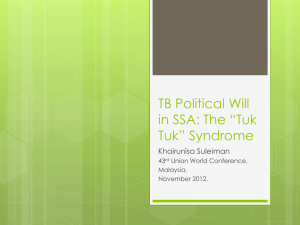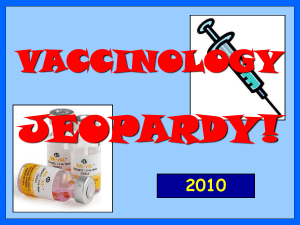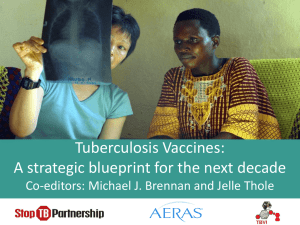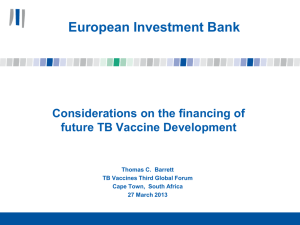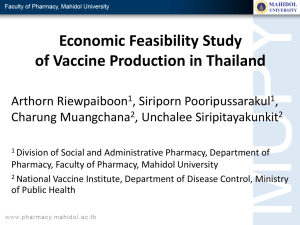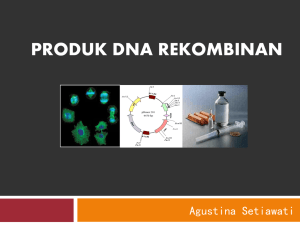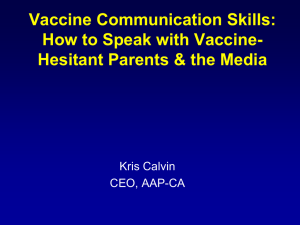The Need for a New TB Vaccine
advertisement
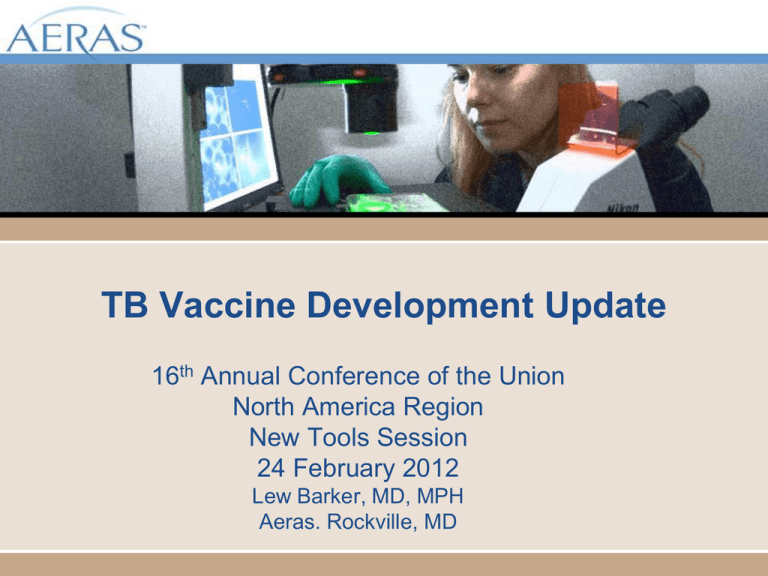
TB Vaccine Development Update 16th Annual Conference of the Union North America Region New Tools Session 24 February 2012 Lew Barker, MD, MPH Aeras. Rockville, MD WHO Global Tuberculosis Control 2011 Report “Major progress in TB care and control has been achieved since the introduction of the DOTS strategy in the mid-1990s and the launch of its successor, the Stop TB Strategy, in 2006. However, progress is constrained by old technologies. To achieve the Stop TB Partnership’s target of eliminating TB by 2050, a transformation in TB prevention, diagnosis and treatment is required.” Outline of Presentation • Introduction: Need for New TB Vaccines • New TB Vaccines: Challenges and Public Health Impact • Clinical Development Progress • Conclusions The Need for a New TB Vaccine • BCG introduced over 90 years ago, not improved upon since then • Reduces risk of severe pediatric (meningeal and miliary) TB disease, but: – Unreliable protection when given to newborns against adult pulmonary TB and TB transmission, which accounts for most TB worldwide – Wide use, but no apparent impact on the global TB epidemic – Not known to protect against latent TB – Not recommended by WHO for use in infants infected with HIV – Many genotypes and phenotypes = BCGs The Potential of New TB Vaccines New, more effective TB vaccines could: • Be safer and more effective in preventing TB in children, adolescents and adults, including people with HIV (for whom BCG is unsafe) • Protect against all forms of TB – including MDR and XDR • Reduce the cost and burden of TB on patients, health care systems and national economies • Contribute significantly to global efforts to control TB Impact of Immunization on Vaccine Preventable Disease From: “Understanding Vaccines” USDHHS NIH/NIAID Science Education) Challenges in TB Vaccine Clinical Development – Many potential antigens; no correlates of protection or validated animal model and complex cell-mediated immunity – TB case definition/diagnosis, especially for infants, difficult – Very large sample sizes required for Phase III efficacy studies – Limited numbers of field sites with high TB incidence for efficacy studies – Large-scale trials are extremely complex and expensive – Lack of regulatory capacity for approving vaccines in developing countries SK Parida and SHE Kaufmann Am J Resp Crit Care Med 2010; 182:1073-1079 8 Better TB Vaccines: Reasons to be Optimistic • Most people (80-90%) do not get disease when infected w Mtb • Evidence of limited BCG vaccine efficacy • HIV/AIDS patients w low CD4 T cells more susceptible to Mtb infection [ role of antibodies controversial ] • New TB vaccine candidates protect in TB animal models • New TB vaccines boost cellular immune responses in multiple clinical studies Potential Impact of a 50% Effective Vaccine TB (all types) Incidence 2000 All age groups Neonatal pre-exposure Neonate pre-exposure + add effects Post-exposure Mass pre-exposure Mass pre-exposure + post-exposure Incidence per million 1600 1200 39 & 37% 52% 800 400 0 2010 80% 92% 2015 2020 2025 2030 Year 2035 2040 2045 2050 Abu-Raddad LJ, Sabatelli L, Achterberg JT, Sugimoto JD, Longini IM Jr, Dye C, Halloran ME. Epidemiological benefits of more effective tuberculosis vaccines, drugs and diagnostics. Proc Natl Acad Sci USA. 2009;106(33):13980-5 TB Epidemiology: Differences in Disease Populations in Different Countries Can Impact Vaccine Approach TB Disease India Primary Infection 62% 19% Re-infection 20% 9% Reactivation 18% 72% * Adapted from Chris Dye, WHO Meeting the Public Health Need Active Disease Latently Infected Pre-infection Infants Adolescents Covered by existing vaccine Adults HIV+ All Ages No coverage or impact from existing vaccine Big Picture • A vaccine or vaccine regimen (prime-boost) that interrupts transmission is key to controlling TB incidence, and can eventually have a big public health impact • Need to prevent disease after initial infection or reactivation from latency • Need to focus on adolescents and young adults (and possibly the elderly), and effect of vaccines in communities Strategy for TB Vaccine Development Preventive/Prophylactic Vaccines – – Improve priming vaccines - Recombinant BCG (rBCG) or live Mtb vaccine Develop novel booster vaccines to extend and enhance immune protection • Deliver in infancy as part of prime-boost regimen • Deliver in adolescents or adults to boost BCG received as infants Immunotherapeutic vaccines – – Prevent reactivation of latent TB Shorten the course of chemotherapy Global TB Vaccine Pipeline (as of December 2000) Phase I Phase II Phase IIb Phase III M. vaccae NIH Mw [M. indicus pranii (MIP)] Dept of Biotechnology (India), M/s. Cadila Prime Boost Post-infection Immunotherapy Currently 12 novel TB Vaccines are in Clinical Trials Phase I Phase II AERAS-422-§ M72+AS01 Aeras GSK, Aeras AdAg85A RUTI McMaster University Archivel Farma Hybrid-I+CAF01 VPM 1002 SSI Max Planck, Vakzine Projekt Mgmt, TBVI Phase III MVA85A/ AERAS-485 Mw [M. indicus pranii (MIP)] Oxford-Emergent Tuberculosis Consortium (OETC), Aeras Dept of Biotechnology (India), M/s. Cadila AERAS-402/ Crucell Ad35 Crucell, Aeras Hyvac 4/ AERAS-404 SSI, Sanofi-Pasteur, Aeras, Intercell\ Phase IIb Hybrid-1+IC31 SSI, TBVI, EDCTP, Intercell SSI H56-IC31 SSI, Aeras, Intercell, TBVI Prime TB Vaccine Types Viral-vectored: MVA85A, AERAS-402, AdAg85A Protein/adjuvant: M72, Hybrid-1, Hyvac 4, H56 rBCG: VPM 1002, AERAS-422 Killed WC or Extract: Mw, RUTI Source: Tuberculosis Vaccine Candidates – 2010; Stop TB Partnership Working Group on New TB Vaccines With updates from sponsors Boost Post-infection Immunotherapy Candidates in Phase IIb: AERAS-485 / MVA85A • Recombinant Modified Vaccinia Ankara Expressing Mtb Antigen 85A • Multiple clinical trials completed and ongoing, including in: – – – – Adults with latent TB infection HIV+ adults Infants Adolescents and children Safety and immunogenicity demonstrated in all clinical trials to date • Two Phase IIb proof-of-concept trials underway – Enrollment of 2797 infants in South Africa completed in April 2011 – Study in HIV+ adults recently initiated in South Africa in Senegal, designed to enroll 1400 participants – Results of Phase IIb trial in infants available in early 2013 AERAS-402: Ad35-Vectored TB Vaccine ITR E1 L1-L3 E2B L4 E2A E3 L5 E4 ITR Genomic Structure E1 deleted; replaced by gene expressing Ag85A/Ag85B/TB10.4 fusion protein E3 partially deleted • Jointly developed by Crucell NV, Leiden, Netherlands and Aeras • Vector is replication deficient Adenovirus Serotype 35 (Ad35) Candidates in Phase IIb: AERAS-402 / Crucell Ad35 • Adenovirus 35 (Ad35)-vectored vaccine containing M. tuberculosis antigens 85A, 85B, and TB10.4 • Multiple trials completed and ongoing, including in: – – – – Adults with latent TB infection Adults with active TB HIV+ adults Infants • Acceptable safety profile to date and appears to be immunogenic (CD8+ T cell responses preferentially) • Multicenter Phase IIb proof-of-concept study underway – Currently (Feb 2012) in expanded safety (n=250) and early efficacy phase – Targeted enrollment:4000 infants across multiple trial sites in Africa, Phase IIb Proof-of-Concept Trials MVA85A AERAS-402/Crucell Ad35 2 Phase IIb trials underway 1 Phase IIb trial underway •Infants (South Africa) •HIV+ Adults (South Africa, Senegal) Partners – Aeras, Wellcome, Emergent/OETC, EDCTP, MRC (The Gambia), IIDMM/UCT, SATVI/UCT (South Africa), Laboratoire de Bacteriologie-Virologie du Centre Hospitalier Universitair Aristide Le Dantec (Senegal) •Infants (Kenya, Mozambique, South Africa, Uganda, Botswana) Partners - Aeras, Crucell, EDCTP, SATVI/UCT(South Africa),KEMRI/CDC (Kenya), CISM (Mozambique), NIAID/DAIDS:IMPAACT and HVTN (6 sites) Together, these trials are designed to enroll ~8,000 volunteers TB Vaccine Development A Decade of Progress but much more to do! 2000 No new 2000 preventive TB vaccines in clinical trials 2002 1st preventive 202 vaccine enters clinical trials (MVA85A) 2009 2011 1st Phase 2009 IIb proof-of-concept of preventive vaccine initiated 15 vaccines have 2011 entered clinical trials, 12 currently in clinical trials •15 novel TB vaccine candidates have been in clinical trials in the last decade but no “winner” yet •Robust pipeline of 2nd generation candidates, novel vaccine constructs and new delivery platforms continue to be explored Summary TB Vaccines Development • New TB vaccines could have a significant impact on the global TB epidemic • Considerable progress is being made in the field of TB vaccine development, with two preventive vaccine candidates now in Phase IIb trials • Manufacturing capacity being developed and manufacturing agreements are being explored with particular emphasis on emerging country manufacturers • Regulatory pathways and market and economic impact research being conducted now to lay the groundwork to accelerate adoption and uptake of new TB vaccines • Scientific, infrastructure and financial challenges remain; solutions will require global partnership and commitment • With sufficient resources and positive results for current clinical trials, it is possible for a new TB vaccine to be available by the end of this decade Aeras gratefully acknowledges the support of the following major donors and contributors Netherlands Ministry of Foreign Affairs US Food and Drug Administration Thank You! For more information: www.aeras.org lbarker@aeras.org
